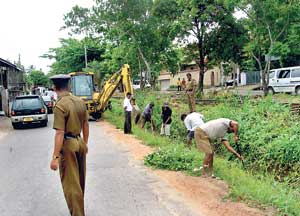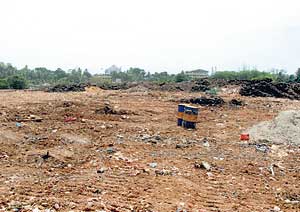Cleaning up clogged drains, systematic collection of garbage, clearing unauthorized structures and cracking down on unhygienic eating houses, there is a new force behind these services essential for the wellbeing of the people.
Silently but solidly supportive of these activities, this force is a new element to ensure smooth functioning of public services not only in cities but also villages, the Sunday Times learns.
Here come the ‘Environment Police’.
The idea had taken root after Colombo was hit by torrential rains early this year, leaving the city flooded, motorists stranded for hours and work paralysed.
 |
| Poorawarama road drains being cleared after 10 years. |
Can you remember the day when Police Park junction was flooded and the traffic jam extended to Nugegoda for several hours, asks Deputy Inspector General (DIG) Anura Senanayake who has a new task under him now in addition to checking crimes and organized crimes, explaining that the difficulties faced by the public prompted the Defence Secretary Gotabaya Rajapaksa to look into what went wrong that day.How and why did the drainage system in the city get clogged during the rains causing severe flooding?
A meeting soon followed on May 18 called by Col. (Ret.) Rajapaksa of stakeholders such as the municipal team et al and also the police. The answer was obvious – the wide network of drains as well as canals was not maintained.
It was then that the Defence Secretary instructed that a system be put in place to carry out such maintenance work and requested the Police Department to join in, says DIG Senanayake.
Initially ‘Operation Environment’ started with police officers being deployed, in a supportive role, to advise and guide the Colombo Municipal Council staff. “We appointed small units comprising six policemen to support each municipal team working in the six districts of the Colombo city,” explained DIG Senanayake.
They did the same with the Sri Lanka Land Reclamation and Development Corporation (SLLRDC), working on the canals crisscrossing the city, he says, commending the huge support from the Navy as well as the Civil Defence Force. “Personnel from the Navy got chest deep into filthy canals to clean them up. In some instances there were unauthorised constructions on canal reservations or drains and we took steps to clear the structures.”
During this time there was also a garbage issue, with no trash collection taking place for six days at Narahenpita and once again Defence Secretary Rajapaksa instructed the police to get involved. “Garbage collection didn’t seem to be happening,” said DIG Senanayake, explaining that the contract for collection and removal had been tendered by the CMC to two private companies. As the police streamlined the system, the complaints flowed in from the people not only about non-collection and non-removal of garbage but also haphazard dumping by the public itself.
 |
| DIG Anura
Senanayake |
In June alone the police made about 100 arrests, advised people against such acts but if they were inveterate dumpers, charged them for a minor offence under the Police Ordinance, he said.
With public confidence swelling and ‘Operation Environment’ bearing fruit came the decision to launch Police Environment Protection Units, replicating the model tried out in Colombo city all over the country in July, the Sunday Times understands.
Detailing the structure of the 136 Police Environment Protection Units including eight in Colombo city, set up under the guidance of Inspector General of Police Mahinda Balasuriya and Senior DIG Administration N.K. Illangakoon, DIG Senanayake says each ‘police district’ coming under an Assistant Superintendent of Police has a unit.
The 12-member unit comprises an Officer-in-Charge or Inspector, a Sub-Inspector, two Sergeants, six police constables and two women police constables. Working in tandem with the relevant stakeholders particularly local government bodies, these units are mandated with wide responsibility. This includes seeing to garbage collection and disposal and haphazard dumping on roads; dealing with mosquito breeding sites and households; removing obstructions on pavements and unauthorized constructions; cracking down on unauthorized filling of state land and low-lying land, those who set fire to forests and lands, resort to illegal clearing of forest reserves to build houses, illegal gem-mining and sand mining or pollute the air as well as run stalls and restaurants that sell food prepared under unhygienic conditions; and implement laws with regard to hoardings, banners and cutouts.
It was decided that all of the 136 Police Environmental Police Units come under one umbrella for easier monitoring, which saw the birth of the Police Environment Protection Division under DIG Senanayake who got the extra portfolio of Environmental Protection Range and comprising DIG Cecil Perera, SSP Quintus Raymond, an ASP and an OIC.
There are thousands of unauthorised constructions on canal and railway reservations and we are drawing up a plan to find alternative housing for these shanty-dwellers without evicting them immediately, said DIG Senanayake stressing that these are humanitarian issues.
 |
| Kolonnawa kunu kanda (garbage mountain) looks today |
There was a two-pronged operation to crackdown on places selling food prepared under unhygienic conditions on August 18 and 20 in Colombo city, according to DIG Senanayake.
Under the first, 142 eating places were raided by 35 Public Health Inspectors (PHIs) and 66 policemen, the Sunday Times understands with 103 samples being taken for testing and 64 cases being filed.
The other raid on 188 such places with 28 PHIs and 30 policemen deployed resulted in 88 samples being taken and 66 cases being filed.Zeroing on banners, hoardings and cut-outs, DIG Senanayake stressed that the laws will be implemented strictly. There will be no banners or hoardings at Galle Face, near the Kanatte at Borella, Independence Square and Independence Avenue, Bauddhaloka Mawatha and along the state drive from Kollupitiya to Parliament. Cut-outs are prohibited on centre-islands, lamp-posts, and traffic lights.
The effectiveness of the Environment Protection Units is amply demonstrated by the meticulous records being maintained since they came into being. The proof lies on the desk of DIG Senanayake with two reports from July 12-30 and August 1-15 indicating the number of cases filed after persuasion and advising have failed.
From across the country, 1,156 have been booked for errant activity in the latter half of July and 2,104 in the first half of August.
Action after big stink hits big guns
The spotlight also fell on the massive Kolonnawa kunu kanda (garbage mountain) after Defence Secretary and DIG Senanayake on a quick unplanned Sunday visit there, were assailed by the unbearable stench and numerous complaints from those living in the vicinity.
Dumping had been so ad hoc that latterly the trucks had to queue up with no place to leave the muck, said DIG Senanayake, adding that although the procedure should have been to dump a layer of garbage and then spread a layer of sand, nothing had happened.
Now, go see the dump, he suggested.
Now you can call…
If there is a problem, here are the numbers to call --
24-hour hotline – 011-2333496 (from across the country)
Colombo North – Kotahena: 011-3188794 & Dematagoda: 011-3081036
Colombo Central – Pettah: 011-3133720; Slave Island: 011-3133637 & Maradana: 011-3050580
Colombo South – Kirulapone: 011-3188884; Bambalapitiya: 011-3133710 & Borella: 011-3133660 |




